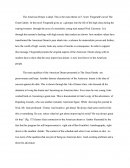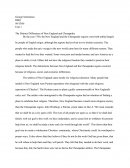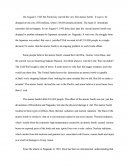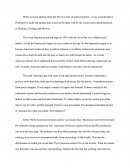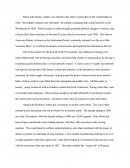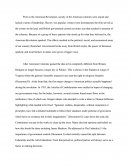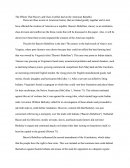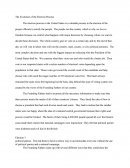American History
There are many popular essays and research papers on American History on Essays24.com.
You can view research papers and essays or use search engine.
4,233 American History Free Essays: 3,361 - 3,390
-
The Cuban Missile Crisis, October 18-29, 1962
On October 22, 1962, President John F. Kennedy was informed that the Soviet Union had secret plans to build missile bases in Cuba, which is 90 miles south of Florida. Kennedy wanted to take the least dangerous approach to this problem and decided to demand from Russian Premier Nikitas Khrushchev
Rating:Words: 370 • Pages: 2 -
The Dark Evil Of Racism
It is much easier to confront the racism of the 1960s than the racial and economic injustices of today. While I'm happy that racist vigilantes such as Edgar Ray Killen have finally been called upon to pay for their crimes, we have work to do in the here and now.
Rating:Words: 365 • Pages: 2 -
The Death Of The American Dream
The American Dream is dead. This is the main theme in F. Scott Fitzgerald's novel The Great Gatsby. In the novel Fitzgerald gives us a glimpse into the life of the high class during the roaring twenties through the eyes of a moralistic young man named Nick Carraway. It is
Rating:Words: 1,595 • Pages: 7 -
The Death Penalty
Xie Name: WeiZe Xie Instructor: Jeffery Hobbie Class: Upper Advanced 1 Date: 9/27/18 The death penalty has been one of the most controversial debates throughout history. However, in modern civilized society, many countries have abolished the death penalty. Everyone’s life is precious. Criminals cannot be arbitrarily deprived of life even
Rating:Words: 578 • Pages: 3 -
The Death Penalty/ Capitol Punishment
Surname Name Professor Title Date [] THE DEATH PENALTY/ CAPITOL PUNISHMENT ‘Capital punishment’ which is otherwise known as the ‘death penalty’ refers to the execution of an individual or group of people sentenced to death after being convicted by a court of law or criminal offense (Wallis 49). Capital punishment
Rating:Words: 1,800 • Pages: 8 -
The Decision To Drop The Bomb
The Decision to Drop the Bomb The decision made by the United States to develop and deploy the first nuclear bombs on the Japanese mainland in 1945 has been one of the most hotly debated issues of the latter part of the twentieth century. But to fully understand the situation,
Rating:Words: 2,836 • Pages: 12 -
The Declaration Of Independence
"The Declaration of Independence" is a document in which the colonies in North America under the rule of Great Britain declared themselves independent and explained their justifications for doing so. It was an important document in U.S. history, which leads to the independence of the United States on July 4th
Rating:Words: 250 • Pages: 1 -
The Declaration Of Independence
-The Declaration of independence was a great successful document written by Thomas Jefferson a great idealist and a man from the age of enlightment, he was a great writer and was the one chosen to write the declaration of independence, he wrote it with a lot of thought about how
Rating:Words: 928 • Pages: 4 -
The Declaration of Independence
Long Essay (Q #1) The Declaration of Independence is a document written by the continental congress, which was later completed by Thomas Jefferson in 1777. This document basically states that America is an independent country and no longer tied to Great Britain, as well as explaining why the colonists wanted
Rating:Words: 677 • Pages: 3 -
The Declaration Of Independence: A Closer Look
In What Did the Declaration Declare?, Joseph J. Ellis, an editor for history publications presents various historical perceptions on the analytical conception of this mythic text of American public life. The Declaration of Independence has enjoyed a long and useful career as an expression of "natural rights," providing Americans with
Rating:Words: 2,765 • Pages: 12 -
The Depression
Imagine for a moment, waking up one day to find yourself on a dirty floor, a pile of rags, or maybe even the street. You look down at yourself to find you're wearing the same clothes you wore yesterday, except they are completely filthy and have lots of holes in
Rating:Words: 839 • Pages: 4 -
The Development Of Christianity In America
As Christianity spread through the Western world, it rarely followed a linear path: different pockets of faith and doctrine were developed by a variety of peoples in an even greater variety of locales. Nowhere is this more evident than in Roman Britain and the era of Anglo-Saxon migrations. In five
Rating:Words: 1,552 • Pages: 7 -
The Distinct Differences Of New England And Chesapeake
George Sotereanos DBQ 09/15/06 Unit 1 The Distinct Differences of New England and Chesapeake By the year 1700, the New England and the Chesapeake regions were both settled largely by people of English origin, although the regions had evolved in two distinct societies. The people who made the epic voyage
Rating:Words: 1,177 • Pages: 5 -
The Diversity Myth
The idea that "diversity" is one of the country's great strengths is now so firmly rooted that virtually anyone can evoke it, praise it, and wallow in it without fear of contradiction. It has become one of the great unassailably American ideas, like democracy, patriotism, the family, or Martin
Rating:Words: 5,495 • Pages: 22 -
The Drover's Wife
The Drover’s Wife Written assignment My story of the painting: “Bye, Emma! I will be home soon. Take care, darling”, my dear husband says, as he is kissing my cheek and grabs the lunch I have made for him. “Bye bye father!” our little boy shouts. He is running about
Rating:Words: 329 • Pages: 2 -
The Duel
The Duel On July 11, 1804 Alexander Hamilton and Aaron Burr both made trips up the Hudson River to the Weehawken fields. The Burr party arrived first and the Hamilton party had arrived second. The two teams had to discuss the "interview." Duels were called interviews because they were illegal
Rating:Words: 563 • Pages: 3 -
The Dust Bowl
The Dust Bowl, also known as the Dirty Thirties, was a period of severe dust storms that greatly damaged the ecology and agriculture of the American and Canadian prairies during the 1930s; severe drought and a failure to apply dryland farming methods to prevent wind erosion (the Aeolian processes) caused
Rating:Words: 280 • Pages: 2 -
The Effect Of Japanese Internment Camps On The Japanese- Americans
On February 19, 1942, President Franklin D. Roosevelt signed Executive Order 9066, which called for the eviction and internment of all Japanese Americans. After Pearl Harbor, all Japanese were looked upon as being capable of sabotage. The Japanese-Americans were transported on buses and trains to camps in California, Utah,
Rating:Words: 739 • Pages: 3 -
The Effect Of The Atomic Bomb On The World
On August 6, 1945 the Enola Gay carried the very first atomic bomb. It was to be dropped on the city of Hiroshima, where 140,000 people perished. The hope of immediate surrender did not happen. So on August 9, 1945 three days later the second atomic bomb was dropped in
Rating:Words: 554 • Pages: 3 -
The Effects Of Great Depression
While we have spoken about the 20's as a time of great prosperity, it was a tad deceptive. Problems lie under the surface that would not be dealt with by the conservative administrations of Harding, Coolidge and Hoover. The Great Depression did not begin in 1929 with the fall of
Rating:Words: 383 • Pages: 2 -
The Effects Of Industrialization On U.S Economy And Society
The Effects of Industrialization on U.S. Economy and Society The rise of industrialization during the 1900s brought many changes to the American economy and society. Urbanization (mainly due to immigration), new technologies, the rise of big business through industrial trusts, and the rise of laissez-faire capitalism are among the most
Rating:Words: 593 • Pages: 3 -
The Effects Of Jacksonian Democracy
When John Quincy Adams was elected to the office of president of the United States in 1824, "hot headed" Jackson was infuriated. He started a campaign that would land him in the Whitehouse in 1828. With his place in office brought profound political change to America, and a direct effect
Rating:Words: 893 • Pages: 4 -
The Effects of the American Revolution
Prior to the American Revolution, society in the American colonies were unjust and lacked a sense of leadership. Slavery was popular, women were disrespected, the elite served as the owners to the land, and British government carried out many acts that resulted in taxation of the colonies. Because of a
Rating:Words: 717 • Pages: 3 -
The Effects Of The War Of 1812
The War of 1812 has always been a part of American history not very exiting to learn about for most Americans. It was a tumultuous time for the New Republic and some of the battles of the war shamed the new nation. The War of 1812 did not have the
Rating:Words: 871 • Pages: 4 -
The Effects Of Westward Expansion 1994 Dbq
At the beginning of the 1840’s there was a new mindset that was summed up by Horace Greeley’s famous quote, “Go West, Young man.” This was only fueled by the numerous Natural and Social environmental advantages of going west. The Natural environment of the West was the land, gold, industry,
Rating:Words: 1,086 • Pages: 5 -
The Effects That Slavery And Class Conflict Had On The American Republic
The Effects That Slavery and Class Conflict had on the American Republic There are three events in American history that are linked greatly together and in turn have effected the creation of America as a republic. Bacon's Rebellion, slavery as an institution, class division and conflict are the three events
Rating:Words: 1,272 • Pages: 6 -
The Election Process
The Evolution of the Election Process The election process in the United States is a valuable process to the election of the proper officials to satisfy the people. The people run the country which is why we live in freedom because we control what happens with major decisions by choosing
Rating:Words: 1,839 • Pages: 8 -
The Electoral College: Rationale And Process
The Founding Fathers wanted to distinguish the newly formed United States from a pure democracy. The Framers defined democracy as government decisions made directly by the people. They decided to use a republic form of government because it promised wiser government. This type of government would allow decisions to be
Rating:Words: 2,423 • Pages: 10 -
The Electoral College: Should We Keep It? Apush Highschool Government
Name Teacher Subject Date DBQ: The Electoral College In recent times, citizens of the U.S. are questioning whether or not the electoral college is still the best way to nominate our leaders. While many support this electoral process, a growing number of Americans are dissatisfied by this system, as new
Rating:Words: 546 • Pages: 3 -
The Elite
Power Elite by C. Wright Mills focuses on nature and function of the elite and how they unite to control state affairs and, to some extent, the non-public relations of people. Mills says "Elite are those who have the most of what there is to have, money, power, and prestige"
Rating:Words: 483 • Pages: 2


